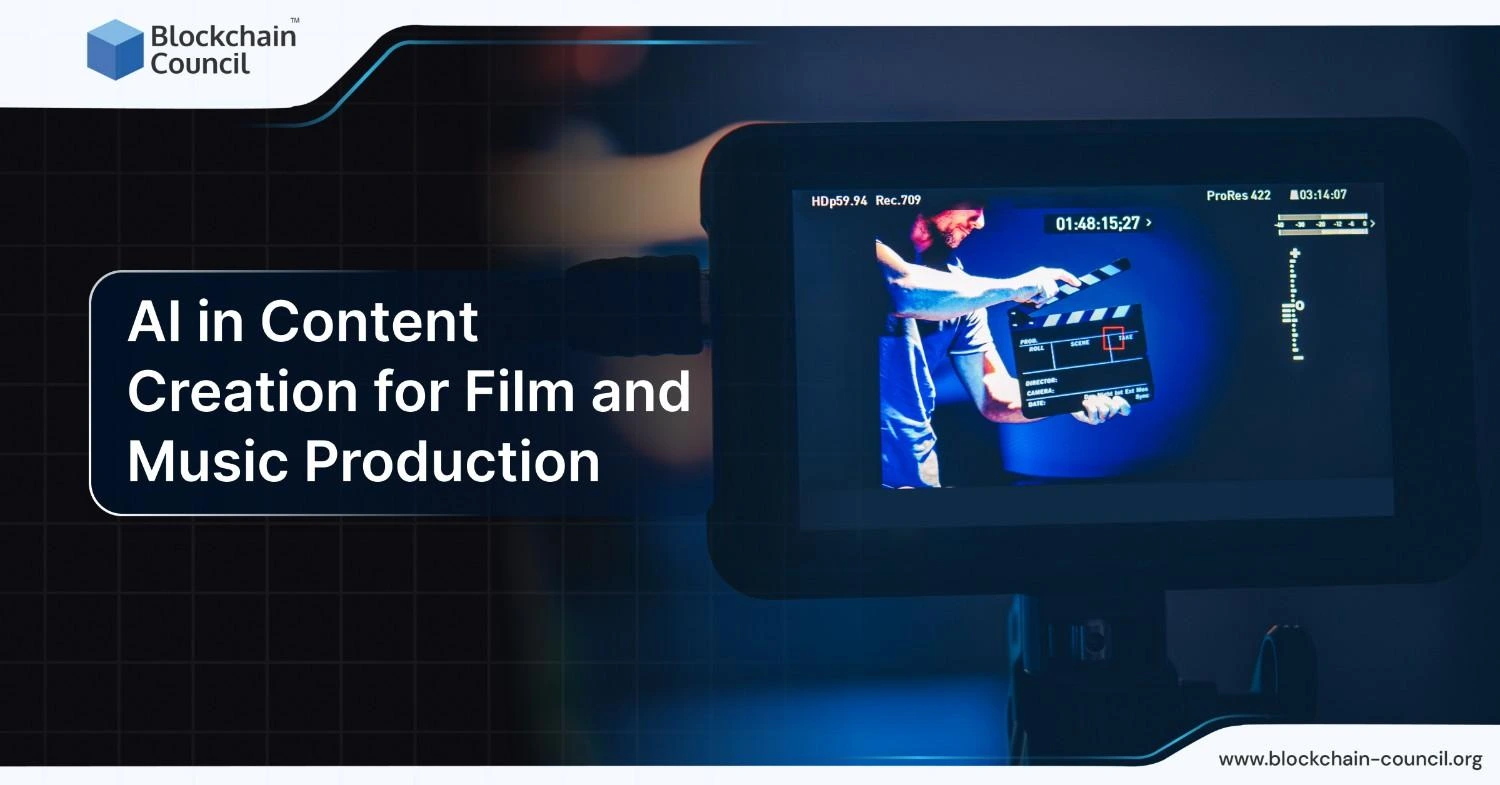
- Blockchain Council
- October 21, 2024
AI has had a growing presence in film and music production. It offers new ways to approach different aspects of the creative process. Films like Everything Everywhere All At Once show how AI is becoming crucial in every step of the creative process.
AI in Film Production
AI technology is becoming more integrated into film production, particularly in areas like post-production, visual effects, and even script writing. Today’s AI tools help with tasks such as color adjustment, analyzing scenes, and putting together rough edits of films. For example, AI can organize scenes by emotional tone and suggest ideal scene lengths, making the editing process quicker while allowing editors to focus more on creative choices.
Platforms like Runway and Pixotope have introduced real-time visual effects, enabling filmmakers to merge live-action with CGI effortlessly. What used to take hours or days, like rotoscoping and compositing, is now automated, freeing up time for other tasks. AI is also useful in color correction, adjusting the tones and brightness in scenes to keep everything looking consistent without much manual effort.
AI plays a significant role in creating digital characters and enhancing visual effects. With large data collections of past models, AI can now build and animate 3D characters swiftly. It’s also increasingly being used for voice synthesis, helping actors create digital doubles. These digital replicas can continue a performance after filming ends. A good example of this is “de-aging” actors using AI-generated visuals, something that’s been used in recent films where older actors appear younger on screen.
Writing the right prompts is crucial when working with AI in creative fields like film and music. That’s why becoming a Certified Prompt Engineer™ is such a smart career move.
AI in Music Production
In the world of music, AI has begun changing how songs are created, mixed, and produced. Programs like Amper Music, Audiomodern Playbeat, AIVA, and Endless AI allow musicians to create beats, melodies, or even entire tracks just by setting preferences like genre, mood, or tempo. These tools make it easier for musicians to experiment, offering endless options for tunes, rhythms, or progressions.
A recent survey showed that around 25% of music producers now use AI in their production process. One popular use of AI in music is called stem separation, where AI can split vocals, drums, or bass from a complete track, making remixing or editing simpler. About 74% of producers using AI rely on it for this specific purpose, as it cuts down on manual work. Moreover, AI is also being used more in mastering and mixing, giving tracks a polished, professional sound without the need for costly equipment or expert help.
Google’s Tone Transfer is another interesting AI tool, allowing musicians to take sounds from one instrument and turn them into something entirely different. This opens up a lot of creative possibilities in music production.
AI in Film Scoring
AI has had a major impact on how film scores are composed. Traditionally, creating a film score involved a composer working closely with the director to craft music that matched the visual story. With AI, this process can be sped up, as AI-generated compositions can align with the director’s vision. For indie filmmakers with tight budgets, this technology provides an affordable way to access high-quality original music. However, there’s concern among professional composers about the risk of losing work due to AI’s involvement.
The Certified Artificial Intelligence (AI) Expert™ title is a great way to set yourself apart. Particularly in industries where creativity and technology blend, such as content creation for film and music.
Other AI Applications in Filmmaking
- Scriptwriting and Storyboarding: AI is being used to examine large sets of scripts, making suggestions for plot development or dialogue based on patterns. This helps filmmakers at the beginning stages of creating a story. AI can also predict how audiences might react to specific scenes or lines, allowing directors to refine their storytelling to better connect with viewers.
- Visual Effects (VFX): In visual effects, AI has made things simpler by automating tasks that previously required manual labor. Tools like DeepDream and GauGAN use neural networks to add details to visuals or transform basic sketches into more intricate images. With AI’s help, complex animations can be generated that still deliver high-quality effects, saving artists a lot of time. AI-powered real-time rendering also helps filmmakers instantly preview scenes during shooting, which can boost both creativity and efficiency.
Want to deepen your understanding of AI in content creation? The Master Artificial Intelligence (AI) Learning Path can provide you with the knowledge to elevate your contributions to film and music production projects.
AI in Post-Production
Post-production tasks like editing and sound design, which once took weeks or months, are now completed much faster with AI assistance. AI can assemble rough film cuts, balance audio, remove background noise, and even adjust scene lengths based on how audiences might emotionally respond. These capabilities allow editors to work at a quicker pace without sacrificing control over the final product.
Ethical Considerations and Future Outlook
While AI’s benefits are clear, its growing role in content creation has sparked some ethical concerns. Questions around intellectual property and who should own creative rights are becoming more relevant. For example, when AI helps write part of a script or produces a piece of music, who should claim ownership? Should AI be listed as a co-creator? These are tricky topics that the industry is still working through.
In the U.S., current copyright law does not recognize works generated by AI as being protected under copyright. This means creators or companies using AI must be upfront about which parts of their projects were made with AI assistance.
As we move ahead, AI’s use in content creation will likely continue to grow. We might see more filmmakers using AI for interactive storytelling, where audience choices influence the plot in real-time. Similarly, musicians may turn to AI more frequently for experimenting with new sounds and genres. However, it’s important that human creativity stays central, ensuring that technology enhances, but doesn’t take over, artistic expression.
As AI becomes a bigger part of the creative process, earning the Certified Artificial Intelligence (AI) Developer™ credential gives you the tools to design more efficient systems for film and music production.
Conclusion
AI has clearly made its presence felt in both film and music production. It offers tools that can make things faster and expand creative possibilities. By automating repetitive tasks, AI gives creators more freedom to focus on their art. While there are important ethical considerations to think about, there’s no doubt that AI will continue to be a part of how films and music are made in the future. The key will be maintaining a balance between machine efficiency and human creativity as the industries evolve.
AI-driven content creation comes with responsibilities. Our Unlimited Learning Subscription (AI) provides you with the latest AI applications to help you meet the requirements in the entertainment industry.


































































 Guides
Guides News
News Blockchain
Blockchain Cryptocurrency
& Digital Assets
Cryptocurrency
& Digital Assets Web3
Web3 Metaverse & NFTs
Metaverse & NFTs
